Doctor Faustus: Exploring Psychological Themes in Marlowe's Play
VerifiedAdded on 2022/11/03
|6
|1633
|234
Essay
AI Summary
This essay provides a comprehensive analysis of Christopher Marlowe's *Doctor Faustus*, focusing on its portrayal as a psychological tragedy. It delves into the protagonist's internal conflicts, particularly the battle between his ambition and conscience, and how these conflicts drive the narrative. The essay explores Faustus's tragic flaw of excessive pride and his insatiable thirst for knowledge, which leads him to make a pact with the devil, Mephistopheles. The study examines the play's exploration of good versus evil, the internal struggle for repentance, and the consequences of Faustus's choices, highlighting the spiritual and emotional anguish he experiences. The essay also examines the themes of ambition, damnation, and the human condition, concluding with a reflection on the play's enduring impact as a profound exploration of the human psyche and the consequences of unchecked desires. The essay references scholarly works to support its arguments, providing a well-rounded understanding of the play's significance.
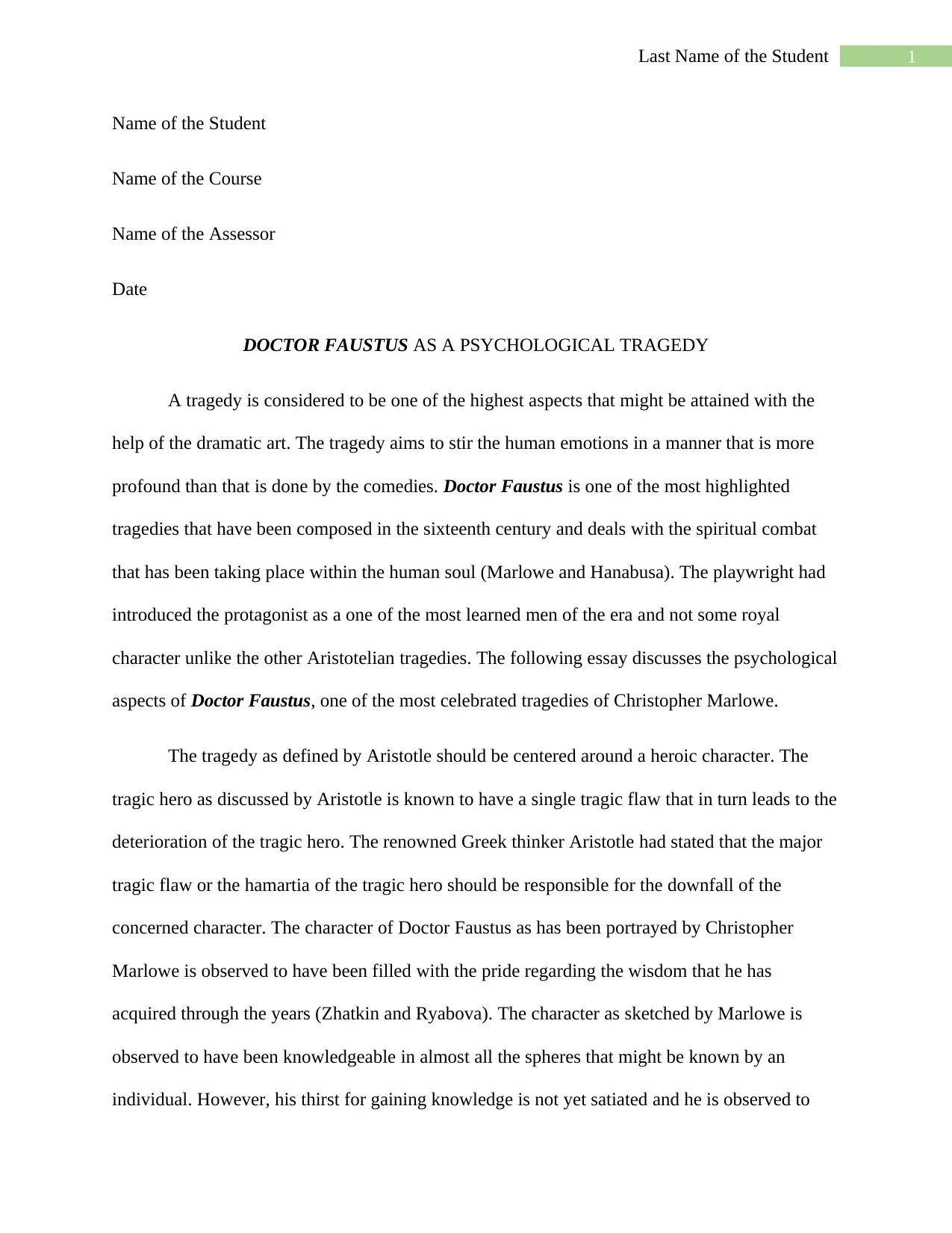
1Last Name of the Student
Name of the Student
Name of the Course
Name of the Assessor
Date
DOCTOR FAUSTUS AS A PSYCHOLOGICAL TRAGEDY
A tragedy is considered to be one of the highest aspects that might be attained with the
help of the dramatic art. The tragedy aims to stir the human emotions in a manner that is more
profound than that is done by the comedies. Doctor Faustus is one of the most highlighted
tragedies that have been composed in the sixteenth century and deals with the spiritual combat
that has been taking place within the human soul (Marlowe and Hanabusa). The playwright had
introduced the protagonist as a one of the most learned men of the era and not some royal
character unlike the other Aristotelian tragedies. The following essay discusses the psychological
aspects of Doctor Faustus, one of the most celebrated tragedies of Christopher Marlowe.
The tragedy as defined by Aristotle should be centered around a heroic character. The
tragic hero as discussed by Aristotle is known to have a single tragic flaw that in turn leads to the
deterioration of the tragic hero. The renowned Greek thinker Aristotle had stated that the major
tragic flaw or the hamartia of the tragic hero should be responsible for the downfall of the
concerned character. The character of Doctor Faustus as has been portrayed by Christopher
Marlowe is observed to have been filled with the pride regarding the wisdom that he has
acquired through the years (Zhatkin and Ryabova). The character as sketched by Marlowe is
observed to have been knowledgeable in almost all the spheres that might be known by an
individual. However, his thirst for gaining knowledge is not yet satiated and he is observed to
Name of the Student
Name of the Course
Name of the Assessor
Date
DOCTOR FAUSTUS AS A PSYCHOLOGICAL TRAGEDY
A tragedy is considered to be one of the highest aspects that might be attained with the
help of the dramatic art. The tragedy aims to stir the human emotions in a manner that is more
profound than that is done by the comedies. Doctor Faustus is one of the most highlighted
tragedies that have been composed in the sixteenth century and deals with the spiritual combat
that has been taking place within the human soul (Marlowe and Hanabusa). The playwright had
introduced the protagonist as a one of the most learned men of the era and not some royal
character unlike the other Aristotelian tragedies. The following essay discusses the psychological
aspects of Doctor Faustus, one of the most celebrated tragedies of Christopher Marlowe.
The tragedy as defined by Aristotle should be centered around a heroic character. The
tragic hero as discussed by Aristotle is known to have a single tragic flaw that in turn leads to the
deterioration of the tragic hero. The renowned Greek thinker Aristotle had stated that the major
tragic flaw or the hamartia of the tragic hero should be responsible for the downfall of the
concerned character. The character of Doctor Faustus as has been portrayed by Christopher
Marlowe is observed to have been filled with the pride regarding the wisdom that he has
acquired through the years (Zhatkin and Ryabova). The character as sketched by Marlowe is
observed to have been knowledgeable in almost all the spheres that might be known by an
individual. However, his thirst for gaining knowledge is not yet satiated and he is observed to
Paraphrase This Document
Need a fresh take? Get an instant paraphrase of this document with our AI Paraphraser
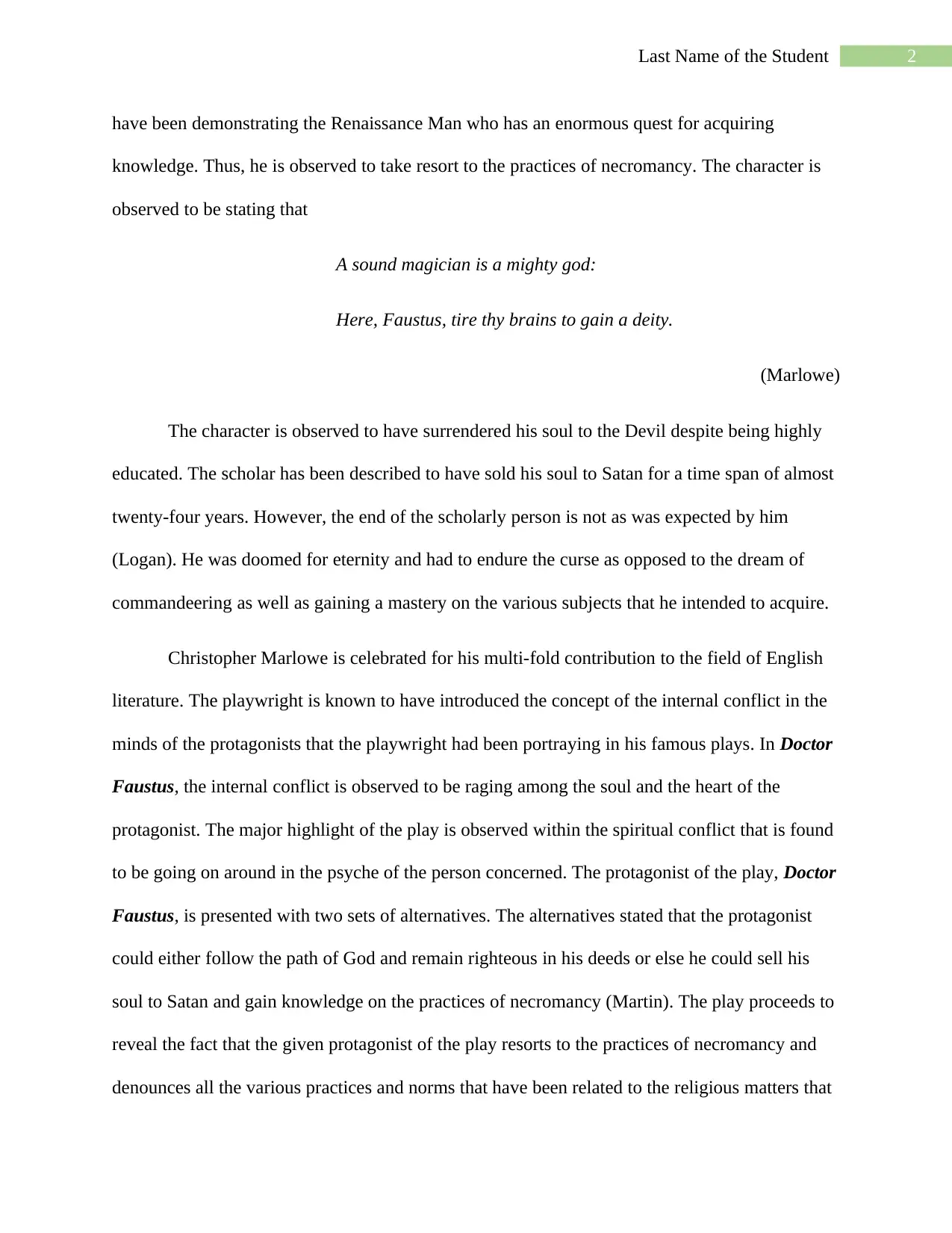
2Last Name of the Student
have been demonstrating the Renaissance Man who has an enormous quest for acquiring
knowledge. Thus, he is observed to take resort to the practices of necromancy. The character is
observed to be stating that
A sound magician is a mighty god:
Here, Faustus, tire thy brains to gain a deity.
(Marlowe)
The character is observed to have surrendered his soul to the Devil despite being highly
educated. The scholar has been described to have sold his soul to Satan for a time span of almost
twenty-four years. However, the end of the scholarly person is not as was expected by him
(Logan). He was doomed for eternity and had to endure the curse as opposed to the dream of
commandeering as well as gaining a mastery on the various subjects that he intended to acquire.
Christopher Marlowe is celebrated for his multi-fold contribution to the field of English
literature. The playwright is known to have introduced the concept of the internal conflict in the
minds of the protagonists that the playwright had been portraying in his famous plays. In Doctor
Faustus, the internal conflict is observed to be raging among the soul and the heart of the
protagonist. The major highlight of the play is observed within the spiritual conflict that is found
to be going on around in the psyche of the person concerned. The protagonist of the play, Doctor
Faustus, is presented with two sets of alternatives. The alternatives stated that the protagonist
could either follow the path of God and remain righteous in his deeds or else he could sell his
soul to Satan and gain knowledge on the practices of necromancy (Martin). The play proceeds to
reveal the fact that the given protagonist of the play resorts to the practices of necromancy and
denounces all the various practices and norms that have been related to the religious matters that
have been demonstrating the Renaissance Man who has an enormous quest for acquiring
knowledge. Thus, he is observed to take resort to the practices of necromancy. The character is
observed to be stating that
A sound magician is a mighty god:
Here, Faustus, tire thy brains to gain a deity.
(Marlowe)
The character is observed to have surrendered his soul to the Devil despite being highly
educated. The scholar has been described to have sold his soul to Satan for a time span of almost
twenty-four years. However, the end of the scholarly person is not as was expected by him
(Logan). He was doomed for eternity and had to endure the curse as opposed to the dream of
commandeering as well as gaining a mastery on the various subjects that he intended to acquire.
Christopher Marlowe is celebrated for his multi-fold contribution to the field of English
literature. The playwright is known to have introduced the concept of the internal conflict in the
minds of the protagonists that the playwright had been portraying in his famous plays. In Doctor
Faustus, the internal conflict is observed to be raging among the soul and the heart of the
protagonist. The major highlight of the play is observed within the spiritual conflict that is found
to be going on around in the psyche of the person concerned. The protagonist of the play, Doctor
Faustus, is presented with two sets of alternatives. The alternatives stated that the protagonist
could either follow the path of God and remain righteous in his deeds or else he could sell his
soul to Satan and gain knowledge on the practices of necromancy (Martin). The play proceeds to
reveal the fact that the given protagonist of the play resorts to the practices of necromancy and
denounces all the various practices and norms that have been related to the religious matters that
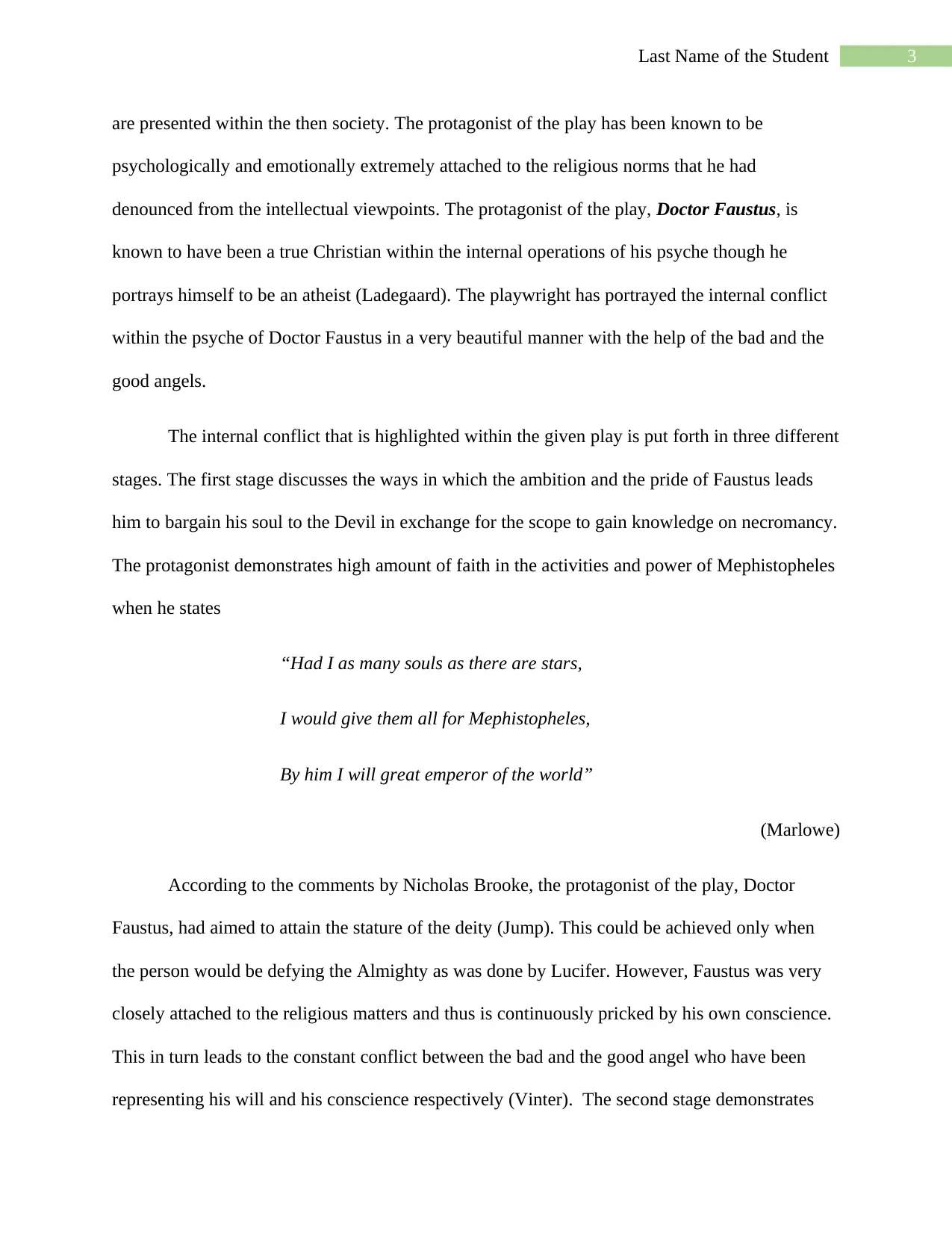
3Last Name of the Student
are presented within the then society. The protagonist of the play has been known to be
psychologically and emotionally extremely attached to the religious norms that he had
denounced from the intellectual viewpoints. The protagonist of the play, Doctor Faustus, is
known to have been a true Christian within the internal operations of his psyche though he
portrays himself to be an atheist (Ladegaard). The playwright has portrayed the internal conflict
within the psyche of Doctor Faustus in a very beautiful manner with the help of the bad and the
good angels.
The internal conflict that is highlighted within the given play is put forth in three different
stages. The first stage discusses the ways in which the ambition and the pride of Faustus leads
him to bargain his soul to the Devil in exchange for the scope to gain knowledge on necromancy.
The protagonist demonstrates high amount of faith in the activities and power of Mephistopheles
when he states
“Had I as many souls as there are stars,
I would give them all for Mephistopheles,
By him I will great emperor of the world”
(Marlowe)
According to the comments by Nicholas Brooke, the protagonist of the play, Doctor
Faustus, had aimed to attain the stature of the deity (Jump). This could be achieved only when
the person would be defying the Almighty as was done by Lucifer. However, Faustus was very
closely attached to the religious matters and thus is continuously pricked by his own conscience.
This in turn leads to the constant conflict between the bad and the good angel who have been
representing his will and his conscience respectively (Vinter). The second stage demonstrates
are presented within the then society. The protagonist of the play has been known to be
psychologically and emotionally extremely attached to the religious norms that he had
denounced from the intellectual viewpoints. The protagonist of the play, Doctor Faustus, is
known to have been a true Christian within the internal operations of his psyche though he
portrays himself to be an atheist (Ladegaard). The playwright has portrayed the internal conflict
within the psyche of Doctor Faustus in a very beautiful manner with the help of the bad and the
good angels.
The internal conflict that is highlighted within the given play is put forth in three different
stages. The first stage discusses the ways in which the ambition and the pride of Faustus leads
him to bargain his soul to the Devil in exchange for the scope to gain knowledge on necromancy.
The protagonist demonstrates high amount of faith in the activities and power of Mephistopheles
when he states
“Had I as many souls as there are stars,
I would give them all for Mephistopheles,
By him I will great emperor of the world”
(Marlowe)
According to the comments by Nicholas Brooke, the protagonist of the play, Doctor
Faustus, had aimed to attain the stature of the deity (Jump). This could be achieved only when
the person would be defying the Almighty as was done by Lucifer. However, Faustus was very
closely attached to the religious matters and thus is continuously pricked by his own conscience.
This in turn leads to the constant conflict between the bad and the good angel who have been
representing his will and his conscience respectively (Vinter). The second stage demonstrates
⊘ This is a preview!⊘
Do you want full access?
Subscribe today to unlock all pages.

Trusted by 1+ million students worldwide
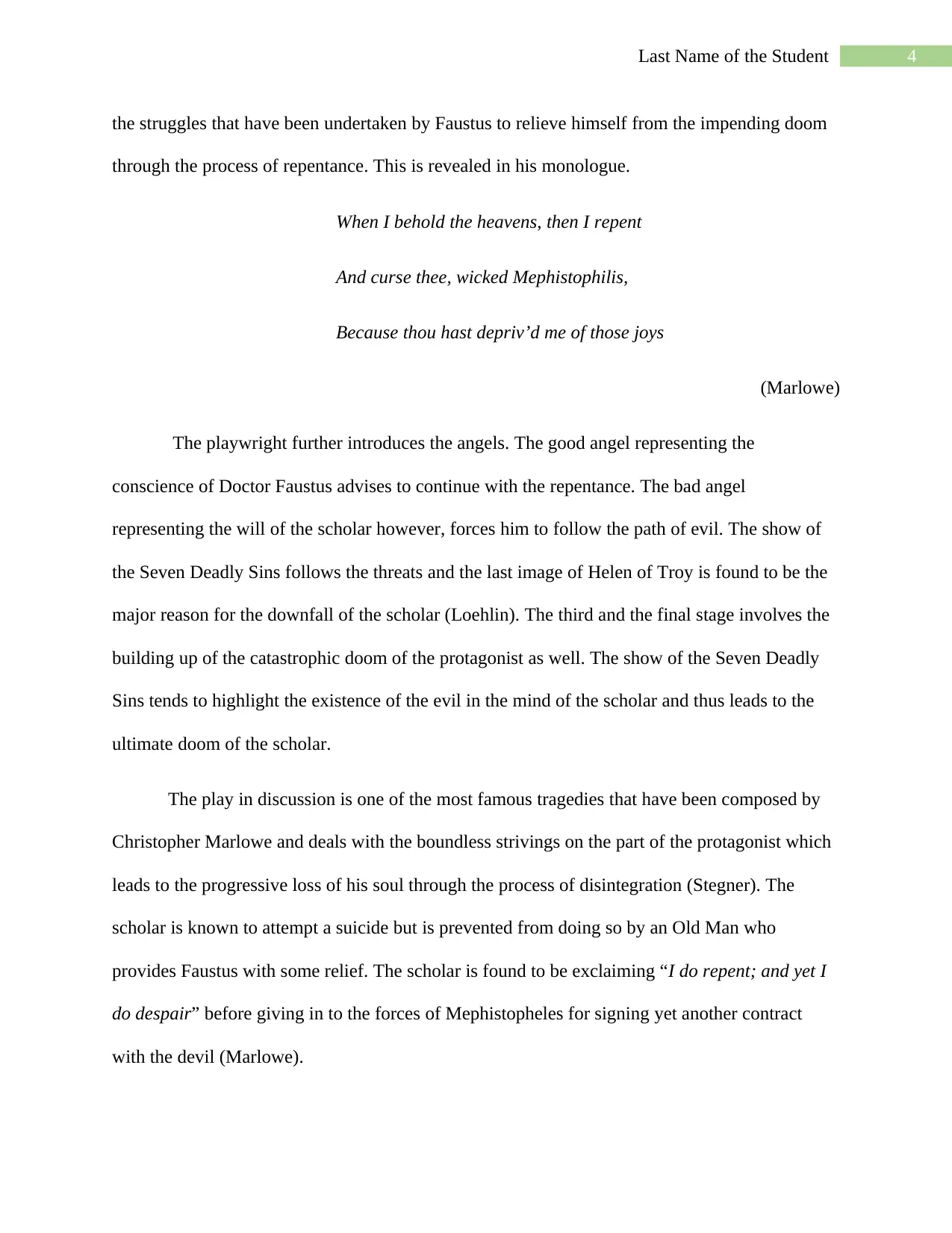
4Last Name of the Student
the struggles that have been undertaken by Faustus to relieve himself from the impending doom
through the process of repentance. This is revealed in his monologue.
When I behold the heavens, then I repent
And curse thee, wicked Mephistophilis,
Because thou hast depriv’d me of those joys
(Marlowe)
The playwright further introduces the angels. The good angel representing the
conscience of Doctor Faustus advises to continue with the repentance. The bad angel
representing the will of the scholar however, forces him to follow the path of evil. The show of
the Seven Deadly Sins follows the threats and the last image of Helen of Troy is found to be the
major reason for the downfall of the scholar (Loehlin). The third and the final stage involves the
building up of the catastrophic doom of the protagonist as well. The show of the Seven Deadly
Sins tends to highlight the existence of the evil in the mind of the scholar and thus leads to the
ultimate doom of the scholar.
The play in discussion is one of the most famous tragedies that have been composed by
Christopher Marlowe and deals with the boundless strivings on the part of the protagonist which
leads to the progressive loss of his soul through the process of disintegration (Stegner). The
scholar is known to attempt a suicide but is prevented from doing so by an Old Man who
provides Faustus with some relief. The scholar is found to be exclaiming “I do repent; and yet I
do despair” before giving in to the forces of Mephistopheles for signing yet another contract
with the devil (Marlowe).
the struggles that have been undertaken by Faustus to relieve himself from the impending doom
through the process of repentance. This is revealed in his monologue.
When I behold the heavens, then I repent
And curse thee, wicked Mephistophilis,
Because thou hast depriv’d me of those joys
(Marlowe)
The playwright further introduces the angels. The good angel representing the
conscience of Doctor Faustus advises to continue with the repentance. The bad angel
representing the will of the scholar however, forces him to follow the path of evil. The show of
the Seven Deadly Sins follows the threats and the last image of Helen of Troy is found to be the
major reason for the downfall of the scholar (Loehlin). The third and the final stage involves the
building up of the catastrophic doom of the protagonist as well. The show of the Seven Deadly
Sins tends to highlight the existence of the evil in the mind of the scholar and thus leads to the
ultimate doom of the scholar.
The play in discussion is one of the most famous tragedies that have been composed by
Christopher Marlowe and deals with the boundless strivings on the part of the protagonist which
leads to the progressive loss of his soul through the process of disintegration (Stegner). The
scholar is known to attempt a suicide but is prevented from doing so by an Old Man who
provides Faustus with some relief. The scholar is found to be exclaiming “I do repent; and yet I
do despair” before giving in to the forces of Mephistopheles for signing yet another contract
with the devil (Marlowe).
Paraphrase This Document
Need a fresh take? Get an instant paraphrase of this document with our AI Paraphraser
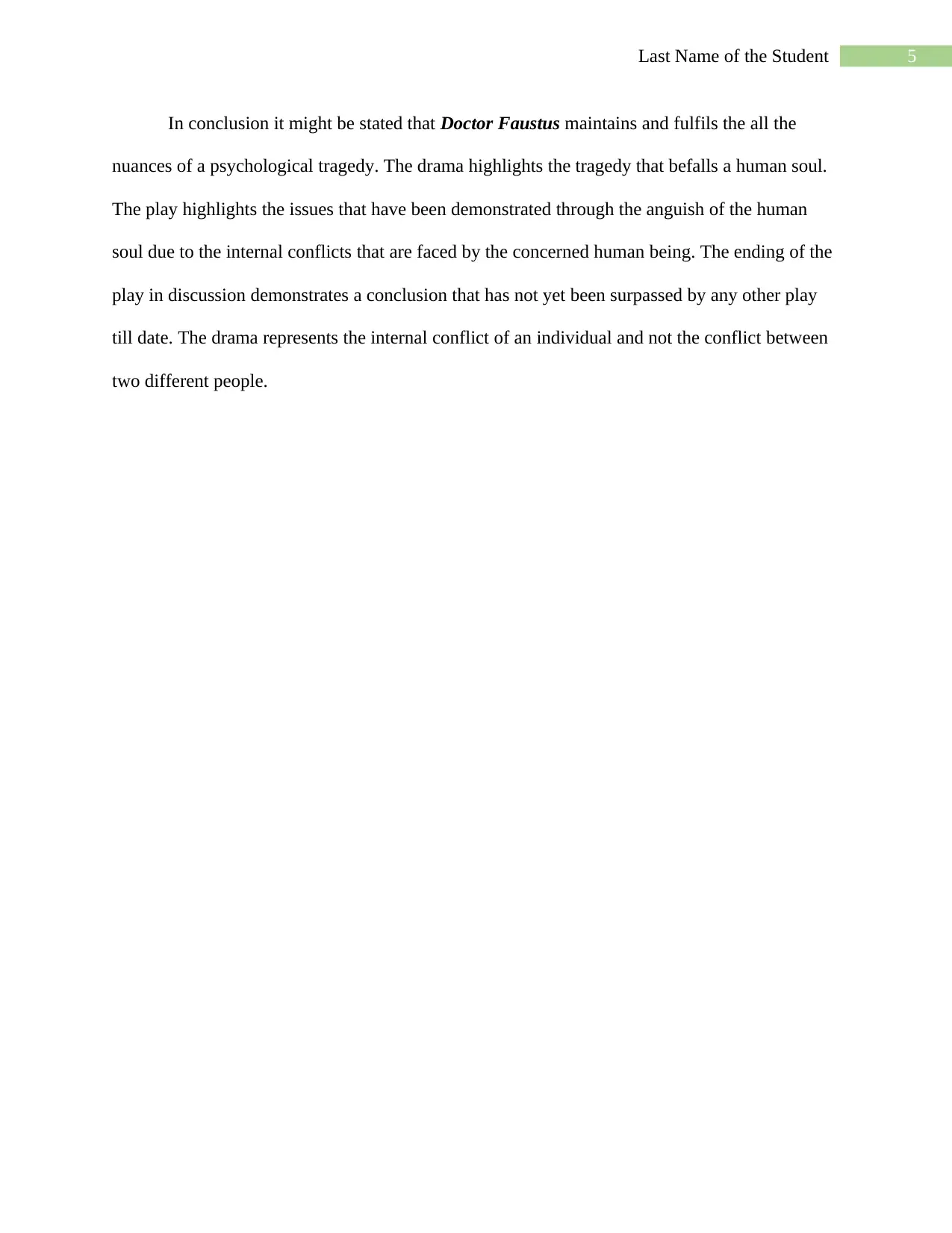
5Last Name of the Student
In conclusion it might be stated that Doctor Faustus maintains and fulfils the all the
nuances of a psychological tragedy. The drama highlights the tragedy that befalls a human soul.
The play highlights the issues that have been demonstrated through the anguish of the human
soul due to the internal conflicts that are faced by the concerned human being. The ending of the
play in discussion demonstrates a conclusion that has not yet been surpassed by any other play
till date. The drama represents the internal conflict of an individual and not the conflict between
two different people.
In conclusion it might be stated that Doctor Faustus maintains and fulfils the all the
nuances of a psychological tragedy. The drama highlights the tragedy that befalls a human soul.
The play highlights the issues that have been demonstrated through the anguish of the human
soul due to the internal conflicts that are faced by the concerned human being. The ending of the
play in discussion demonstrates a conclusion that has not yet been surpassed by any other play
till date. The drama represents the internal conflict of an individual and not the conflict between
two different people.
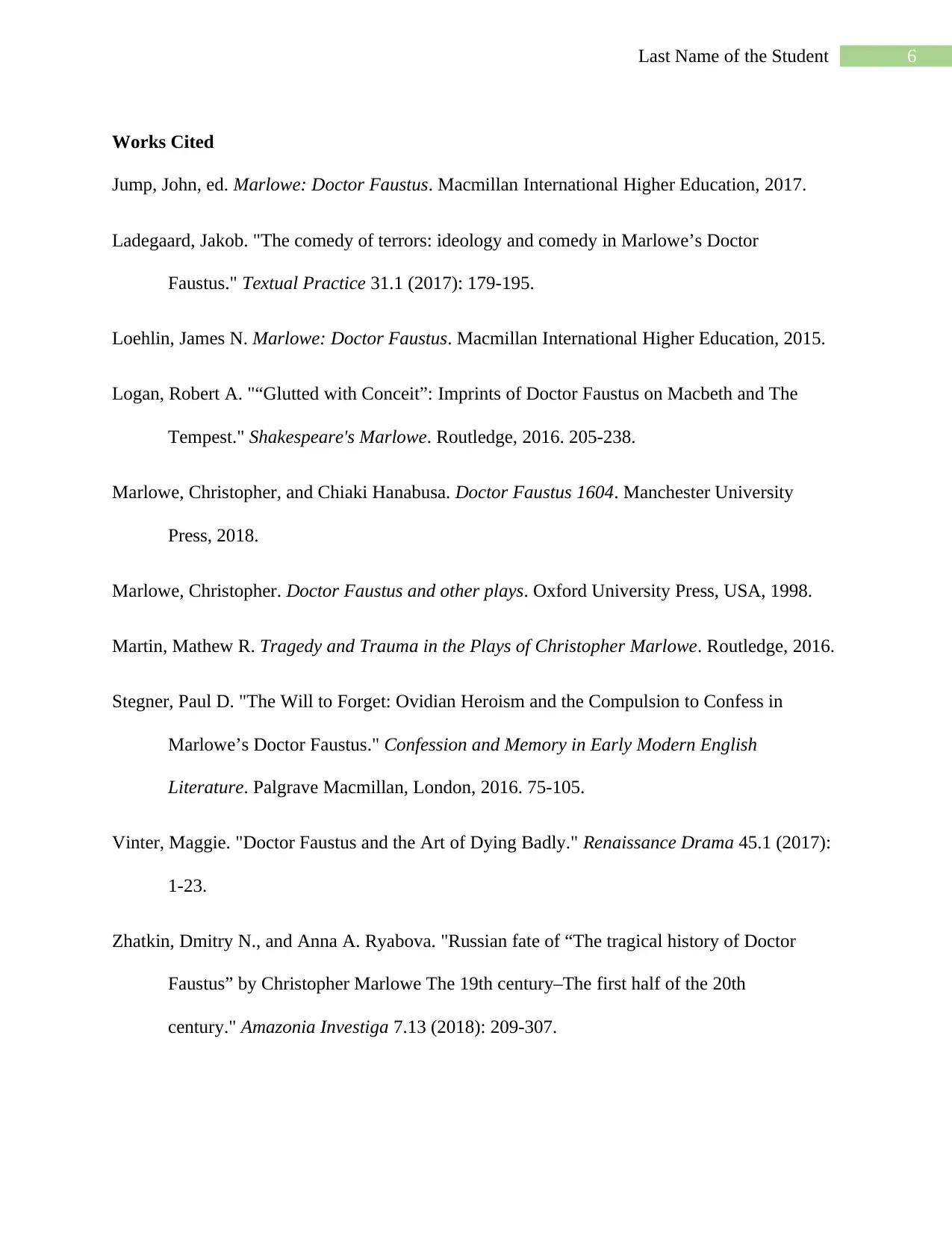
6Last Name of the Student
Works Cited
Jump, John, ed. Marlowe: Doctor Faustus. Macmillan International Higher Education, 2017.
Ladegaard, Jakob. "The comedy of terrors: ideology and comedy in Marlowe’s Doctor
Faustus." Textual Practice 31.1 (2017): 179-195.
Loehlin, James N. Marlowe: Doctor Faustus. Macmillan International Higher Education, 2015.
Logan, Robert A. "“Glutted with Conceit”: Imprints of Doctor Faustus on Macbeth and The
Tempest." Shakespeare's Marlowe. Routledge, 2016. 205-238.
Marlowe, Christopher, and Chiaki Hanabusa. Doctor Faustus 1604. Manchester University
Press, 2018.
Marlowe, Christopher. Doctor Faustus and other plays. Oxford University Press, USA, 1998.
Martin, Mathew R. Tragedy and Trauma in the Plays of Christopher Marlowe. Routledge, 2016.
Stegner, Paul D. "The Will to Forget: Ovidian Heroism and the Compulsion to Confess in
Marlowe’s Doctor Faustus." Confession and Memory in Early Modern English
Literature. Palgrave Macmillan, London, 2016. 75-105.
Vinter, Maggie. "Doctor Faustus and the Art of Dying Badly." Renaissance Drama 45.1 (2017):
1-23.
Zhatkin, Dmitry N., and Anna A. Ryabova. "Russian fate of “The tragical history of Doctor
Faustus” by Christopher Marlowe The 19th century–The first half of the 20th
century." Amazonia Investiga 7.13 (2018): 209-307.
Works Cited
Jump, John, ed. Marlowe: Doctor Faustus. Macmillan International Higher Education, 2017.
Ladegaard, Jakob. "The comedy of terrors: ideology and comedy in Marlowe’s Doctor
Faustus." Textual Practice 31.1 (2017): 179-195.
Loehlin, James N. Marlowe: Doctor Faustus. Macmillan International Higher Education, 2015.
Logan, Robert A. "“Glutted with Conceit”: Imprints of Doctor Faustus on Macbeth and The
Tempest." Shakespeare's Marlowe. Routledge, 2016. 205-238.
Marlowe, Christopher, and Chiaki Hanabusa. Doctor Faustus 1604. Manchester University
Press, 2018.
Marlowe, Christopher. Doctor Faustus and other plays. Oxford University Press, USA, 1998.
Martin, Mathew R. Tragedy and Trauma in the Plays of Christopher Marlowe. Routledge, 2016.
Stegner, Paul D. "The Will to Forget: Ovidian Heroism and the Compulsion to Confess in
Marlowe’s Doctor Faustus." Confession and Memory in Early Modern English
Literature. Palgrave Macmillan, London, 2016. 75-105.
Vinter, Maggie. "Doctor Faustus and the Art of Dying Badly." Renaissance Drama 45.1 (2017):
1-23.
Zhatkin, Dmitry N., and Anna A. Ryabova. "Russian fate of “The tragical history of Doctor
Faustus” by Christopher Marlowe The 19th century–The first half of the 20th
century." Amazonia Investiga 7.13 (2018): 209-307.
⊘ This is a preview!⊘
Do you want full access?
Subscribe today to unlock all pages.

Trusted by 1+ million students worldwide
1 out of 6
Related Documents
Your All-in-One AI-Powered Toolkit for Academic Success.
+13062052269
info@desklib.com
Available 24*7 on WhatsApp / Email
![[object Object]](/_next/static/media/star-bottom.7253800d.svg)
Unlock your academic potential
Copyright © 2020–2025 A2Z Services. All Rights Reserved. Developed and managed by ZUCOL.





